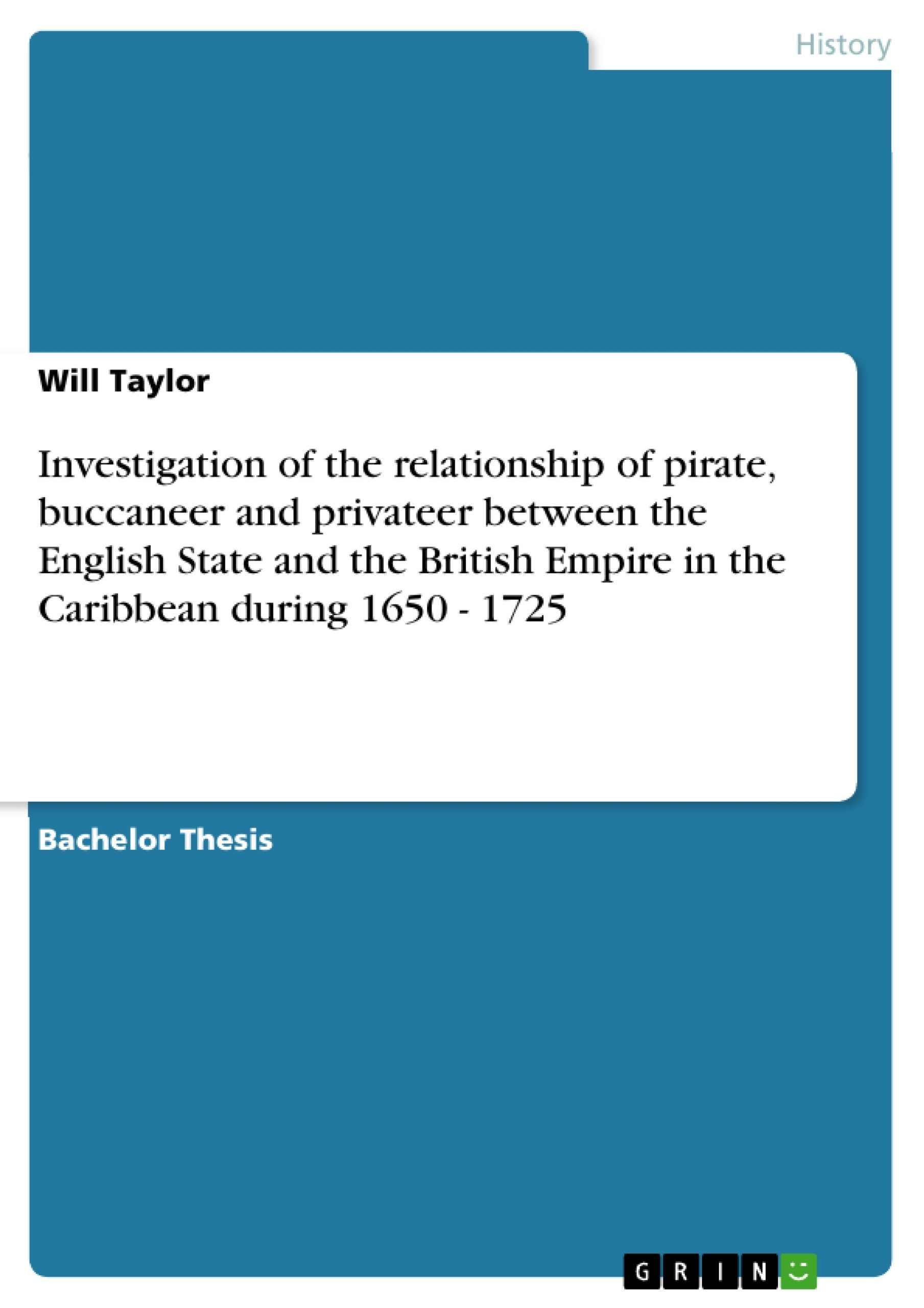This investigation will examine the English State’s and latter British Empire’s evolving relationship with pirates, buccaneers and privateers as well looking into how far they contributed to laying the foundations of the British Empire in the Caribbean. The investigation will identify numerous ways in which these outlaws contributed to the basis of an Empire as bands of men, but also as individual men – pointing the investigation into examining individual Captains themselves and assessing the significance of their endeavours. Pirate, privateering and buccaneering warfare tactics will also be scrutinised as the significance of their methods cannot be ignored in the defence of British colonies in the New World. Throughout the investigation, various primary materials will be used to help re-enforce arguments where needed. In addition, numerous prominent historians in this field will be made reference to, and used in order to help structure the argument that in order to fully appreciate Britain’s history of Empire, the significance of robbers on the high seas cannot be ignored.
Table of Contents
- Abstract
- Introduction
- Part 1
- IDENTIFYING PIRATES AND UNDERSTANDING THE EVOLUTION OF PIRACY AND ITS SHIFTING RELATIONSHIP WITH THE ENGLISH STATE IN THE EARLY MODERN ERA.
- Part 2
- INFLUENTIAL PIRATICAL FIGURES
- Admiral Sir Henry Morgan
- William Dampier
- Christopher Myngs
- Woodes Rogers
- Part 3
- THE PIRATE AND BUCCANEERING ART OF WAR
- Land Battles
- Naval Warfare
- Conclusion
- References
Objectives and Key Themes
This dissertation investigates the evolving relationship between pirates, buccaneers, and privateers and the English state, specifically examining their contribution to the establishment of the British Empire in the Caribbean between 1650 and 1725. The study explores the ways in which these individuals and groups contributed to imperial expansion, both as collective forces and through the actions of individual captains. Key themes explored in the dissertation include:- The evolution of piracy and its relationship with the English state in the early modern era
- The contributions of influential piratical figures, including Henry Morgan, William Dampier, Christopher Myngs, and Woodes Rogers
- The pirate and buccaneering art of warfare, focusing on both land and naval tactics
- The economic and financial implications of piracy for the developing British Empire
- The impact of piracy on the social and political landscape of the Caribbean
Chapter Summaries
- Introduction: This chapter sets the stage for the investigation, highlighting the importance of the period 1650-1725 as the "Golden Age of Piracy" in the Caribbean. It challenges common perceptions of pirates as romanticized rebels and emphasizes the significant role they played in laying the foundations of the British Empire. The chapter also explores the historical context of the period, noting the rise of buccaneering and privateering alongside the decline of the Spanish Empire.
- Part 1: Identifying Pirates and Understanding the Evolution of Piracy: This section examines the shifting relationship between piracy and the English state during the early modern era. It explores the efforts of the English elite to distinguish between imperialists and pirates, the state's use of laws and propaganda to crack down on piracy, and the paradoxical acceptance of pirates in certain periods. The chapter also considers the pirate code of conduct and its connection to the state's evolving perspective on piracy.
- Part 2: Influential Piratical Figures: This section delves into the lives and contributions of four prominent figures: Henry Morgan, William Dampier, Christopher Myngs, and Woodes Rogers. It analyzes their individual roles in the expansion of the British Empire, focusing on their economic, navigational, and military contributions. The chapter highlights how these figures, through their actions and exploits, played significant roles in shaping the development of the British Empire.
- Part 3: The Pirate and Buccaneering Art of War: This section examines the tactics and strategies employed by pirates and buccaneers, both on land and at sea. It explores their innovative approaches to warfare, emphasizing the significance of these methods in defending British colonies in the New World. The chapter sheds light on the strategic importance of piratical warfare in the establishment and expansion of the British Empire.
Keywords
The dissertation focuses on the interrelationships between piracy, buccaneering, privateering, and the English state, examining their contributions to the development of the British Empire in the Caribbean during the period 1650-1725. Key terms and concepts include: piracy, buccaneering, privateering, British Empire, Caribbean, colonialism, imperial expansion, warfare, economics, and influential figures such as Henry Morgan, William Dampier, Christopher Myngs, and Woodes Rogers.- Quote paper
- Will Taylor (Author), 2010, Investigation of the relationship of pirate, buccaneer and privateer between the English State and the British Empire in the Caribbean during 1650 - 1725, Munich, GRIN Verlag, https://www.grin.com/document/171120




